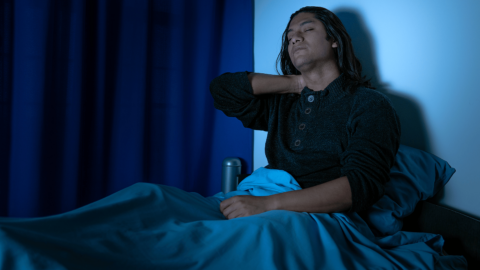If you’re going through opioid withdrawal, you might notice that symptoms feel much worse at night. Maybe you can’t stop tossing and turning, your legs won’t stay still, or waves of anxiety hit the moment you lie down.
This isn’t just in your head—opioid withdrawal symptoms do tend to peak at night, making sleep nearly impossible. But why does this happen? And more importantly, how can you actually get some rest while detoxing?
In this article, we’ll explore why opioid withdrawal feels worse at night, and more importantly, what you can do to improve your sleep during detox—including medications, supplements, and natural strategies that actually help.
Why Do Opioid Withdrawals Get Worse at Night?
Several factors contribute to why withdrawal symptoms intensify after dark:
1. Your Body Follows a Natural Rhythm (Circadian Cycle)
Your body’s internal clock (circadian rhythm) regulates pain sensitivity, body temperature, and hormone levels—all of which fluctuate at night.
- Cortisol (your body’s natural stress hormone) drops in the evening, making withdrawal symptoms like anxiety, restlessness, and pain feel more intense.
- Endorphins (your body’s natural painkillers) are lowest at night, making opioid withdrawal feel even worse.
2. No Distractions = More Focus on Discomfort
During the day, you’re moving around, working, or watching TV, which keeps your mind somewhat distracted. But at night, when everything is quiet, your brain zeroes in on withdrawal symptoms, making them feel even more unbearable.
3. Restless Legs and Muscle Aches Get Worse When You’re Still
One of the most frustrating withdrawal symptoms is restless leg syndrome (RLS)—that uncontrollable urge to move your legs. This happens because:
- Opioid withdrawal throws off dopamine levels, which play a role in muscle control.
- Lying still for too long makes the discomfort more noticeable, increasing the urge to move.
4. Anxiety and Insomnia Go Hand-in-Hand
Withdrawal causes increased adrenaline, rapid heart rate, and racing thoughts—all of which make it nearly impossible to relax enough to sleep. Many people also experience night sweats, nightmares, or waking up constantly, making the little sleep they do get low quality.
How Long Does Insomnia Last During Opioid Withdrawal?
- Acute withdrawal (first 5-10 days): Severe insomnia, frequent waking, restlessness.
- Post-acute withdrawal (weeks to months): Sleep patterns slowly improve but may still be disrupted.
- Long-term recovery (3+ months): Most people regain normal sleep, but some experience ongoing sleep disturbances.
The good news? There are ways to speed up this process and get better sleep sooner.
How to Sleep Better During Opioid Withdrawal
If withdrawal is keeping you up at night, these strategies can help:
Medications That Can Help with Sleep
- Clonidine – Reduces anxiety, sweating, and restlessness, helping calm your nervous system.
- Tizanidine or Baclofen – Muscle relaxers that can help with restless legs and body aches.
- Trazodone – A non-addictive sleep aid that helps with insomnia and anxiety.
- Gabapentin or Pregabalin (Lyrica) – Can reduce nerve pain, anxiety, and RLS symptoms.
- Melatonin – A natural sleep hormone that helps reset your circadian rhythm.
What to Avoid: Benzodiazepines (Xanax, Ativan), Z-drugs (Ambien), and strong sleep aids can be addictive and may slow down recovery.
Natural Ways to Improve Sleep During Detox
- Stick to a Sleep Schedule – Go to bed and wake up at the same time every day, even if you only get a few hours of sleep.
- Take a Warm Bath Before Bed – Helps relax muscles and reduce body aches.
- Avoid Screens Before Bed – Blue light from phones interferes with melatonin production, making it harder to fall asleep.
- Try a Weighted Blanket – Helps with anxiety and restlessness by applying gentle pressure to the body.
- Use White Noise or Meditation Apps – Background noise can distract your brain from withdrawal symptoms.
Pro Tip: If restless legs keep you up, try soaking your feet in hot water before bed or using a heating pad on your calves.
What If You Still Can’t Sleep? When to Seek Help
If severe insomnia lasts more than two weeks, or withdrawal symptoms are completely unbearable, you might need medical support to ease the process.
- Consider medication-assisted treatment (MAT) like Suboxone—which not only helps with cravings but also makes withdrawal symptoms (including insomnia) much more manageable.
How QuickMD Can Help You Sleep Better During Opioid Detox
If you’re struggling with severe withdrawal and can’t sleep, QuickMD’s online doctors can help you start Suboxone or prescribe non-addictive medications to help you through withdrawal.
Why Choose QuickMD?
- Same-day Suboxone prescriptions—sent to your pharmacy.
- Online doctor visits—no in-person clinic required.
- Treatment for withdrawal symptoms like insomnia, anxiety, and RLS.
- Licensed addiction specialists available 7 days a week.
Get the Sleep You Need to Recover
Opioid withdrawal insomnia doesn’t have to last forever. If you need help getting through detox, talk to a doctor who can make the process easier.
Final Thoughts
- Opioid withdrawal symptoms often feel worse at night due to hormone cycles, increased awareness, and restless legs.
- Acute withdrawal insomnia lasts 1-2 weeks, but sleep improves over time.
- Certain medications and sleep strategies can help improve rest.
- Suboxone or other MAT options can make withdrawal much more manageable.
If you’re struggling to sleep through withdrawal and need expert support, QuickMD’s online doctors can help you start treatment safely and effectively.




